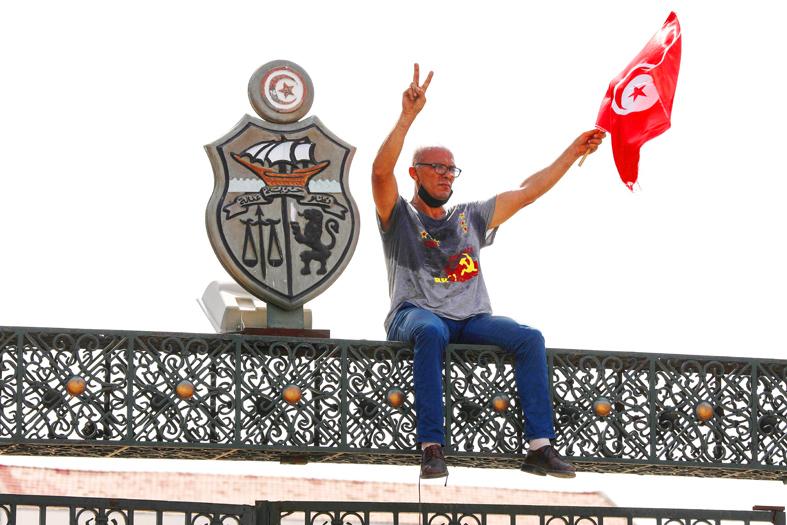Street clashes yesterday erupted outside Tunisia’s army-barricaded parliament, a day after Tunisian President Kais Saied ousted the prime minister and suspended the legislature, plunging the young democracy into a constitutional crisis.
Saied sacked Hichem Mechichi and ordered parliament closed for 30 days, a move the biggest political party Ennahdha decried as a “coup,” following a day of angry street protests against the government’s handling of the COVID-19 pandemic.
Soldiers early yesterday blockaded the assembly in Tunis while, outside, the president’s supporters hurled stones and insults at backers of Islamist-inspired Ennahdha, whose leader staged a sit-in to protest being barred entry to the complex.

Photo: EPA-EFE
Saied’s dramatic move — a decade on from Tunisia’s 2011 revolution, often held up as the Arab Spring’s sole success story — comes even though the constitution enshrines a parliamentary democracy and largely limits presidential powers to security and diplomacy.
It “is a coup d’etat against the revolution and against the constitution,” Ennahda, which was the biggest party in Tunisia’s fractious ruling coalition, said in a Facebook post, warning that its members “will defend the revolution.”
The crisis follows prolonged deadlock between the president, the prime minister and Ennahda chief Rached Ghannouchi, which has crippled the pandemic response as deaths have surged to one of the world’s highest per capita rates.
“I have taken the necessary decisions to save Tunisia, the state and the Tunisian people,” Saied said in a statement on Sunday, a day that had seen COVID-19 street protests flare in multiple cities.
The president’s announcement sparked jubilant rallies by many thousands of his supporters who flooded the streets of the capital late on Sunday to celebrate and wave the national flag, as car horns sounded through the night and fireworks lit up the sky.
However, the shock move was criticized abroad. The Turkish Ministry of Foreign Affairs said it was “deeply concerned” and called for “democratic legitimacy” to be restored.
A spokeswoman for the German Ministry of Foreign Affairs, Maria Adebahr, told reporters that Berlin hoped Tunisia would return “as soon as possible to constitutional order.”
Kremlin spokesman Dmitri Peskov, in brief comments, said Russia was monitoring developments in Tunisia.
“We hope that nothing will threaten the stability and security of the people of that country,” he told reporters at a daily phone briefing.
Before Saied’s announcement, thousands had marched in several cities protesting against Ennahda, criticizing the lead party in Tunisia’s government for failures in tackling the pandemic.
A senior Ennahda official, speaking on condition of anonymity, alleged that the protests before Saied’s announcement, and the subsequent celebrations, had all been choreographed by the president.
“We are also capable of organizing large demonstrations to show the number of Tunisians who are opposed to these decisions,” this official said.
Since Saied was elected in 2019, he has been locked in a showdown with Mechichi and Ghannouchi, who is also house speaker. The rivalry has blocked ministerial appointments and diverted resources from tackling Tunisia’s many economic and social problems.

CARROT AND STICK: While unrelenting in its military threats, China attracted nearly 40,000 Taiwanese to over 400 business events last year Nearly 40,000 Taiwanese last year joined industry events in China, such as conferences and trade fairs, supported by the Chinese government, a study showed yesterday, as Beijing ramps up a charm offensive toward Taipei alongside military pressure. China has long taken a carrot-and-stick approach to Taiwan, threatening it with the prospect of military action while reaching out to those it believes are amenable to Beijing’s point of view. Taiwanese security officials are wary of what they see as Beijing’s influence campaigns to sway public opinion after Taipei and Beijing gradually resumed travel links halted by the COVID-19 pandemic, but the scale of

TRADE: A mandatory declaration of origin for manufactured goods bound for the US is to take effect on May 7 to block China from exploiting Taiwan’s trade channels All products manufactured in Taiwan and exported to the US must include a signed declaration of origin starting on May 7, the Bureau of Foreign Trade announced yesterday. US President Donald Trump on April 2 imposed a 32 percent tariff on imports from Taiwan, but one week later announced a 90-day pause on its implementation. However, a universal 10 percent tariff was immediately applied to most imports from around the world. On April 12, the Trump administration further exempted computers, smartphones and semiconductors from the new tariffs. In response, President William Lai’s (賴清德) administration has introduced a series of countermeasures to support affected

Pope Francis is be laid to rest on Saturday after lying in state for three days in St Peter’s Basilica, where the faithful are expected to flock to pay their respects to history’s first Latin American pontiff. The cardinals met yesterday in the Vatican’s synod hall to chart the next steps before a conclave begins to choose Francis’ successor, as condolences poured in from around the world. According to current norms, the conclave must begin between May 5 and 10. The cardinals set the funeral for Saturday at 10am in St Peter’s Square, to be celebrated by the dean of the College

CROSS-STRAIT: The vast majority of Taiwanese support maintaining the ‘status quo,’ while concern is rising about Beijing’s influence operations More than eight out of 10 Taiwanese reject Beijing’s “one country, two systems” framework for cross-strait relations, according to a survey released by the Mainland Affairs Council (MAC) on Thursday. The MAC’s latest quarterly survey found that 84.4 percent of respondents opposed Beijing’s “one country, two systems” formula for handling cross-strait relations — a figure consistent with past polling. Over the past three years, opposition to the framework has remained high, ranging from a low of 83.6 percent in April 2023 to a peak of 89.6 percent in April last year. In the most recent poll, 82.5 percent also rejected China’s